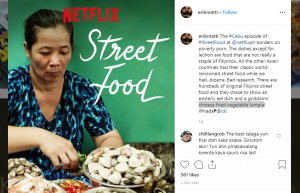Celebrated director Erik Matti clarified his scathing opinion about an episode of a food show after he received widespread criticisms for it.
Matti aired his dissatisfaction on Facebook with the chosen dishes on the Netflix show “Street Food Asia.”
This post earned the ire of some Filipinos. The veteran filmmaker soon addressed this on Twitter.
“Twitter world, please don’t put words in my mouth. I am not saying eel bakasi is not good. I am not saying Cebu food is not good. I love Cebu food,” Matti said on April 29.
He claimed the eel dish and the Chinese fried vegetable lumpia featured in the show as not authentic Filipino street foods.
The “Buy Bust” director went on and questioned the reason for choosing these dishes to represent the street food in the Philippines.
“The eel bakasi is just not IDENTIFIABLY regarded as a quintessential Filipino street food that can represent our food to the world,” Matti said.
“Ilocano fried empanada is much more truly Filipino,” he added.
Matti soon deleted his Facebook post. However, he kept the copy of it on Instagram.

Fellow filmmaker Joey Javier Reyes said he agreed with Matti’s take.
I agree with Erik Matti.The Cebu episode of Netflix's STREET FOOD is an EPIC FAIL. Whereas other Asian countries…
Posted by Joey Reyes on Monday, April 29, 2019
“I agree with Erik Matti. The Cebu episode of Netflix’s street food is an epic fail. Whereas other Asian countries highlighted the celebration of food as a way of life, the Philippine segment showed food as an act of survival against poverty,” Reyes said on Facebook.
“Excuse me, Cebuanos are far above that,” he added.
Matti was recently tapped by Singaporean filmmaker Eric Khoo to take the helm of an episode for an upcoming food anthology series called “Food Lore” for HBO Asia.
Khoo said he admired Matti’s gritty films “On the Job” and “Buy Bust.”
The new eight-part program is expected to premiere in November.
Street food in Cebu
The food scene in Cebu got handpicked for the “Street Food Asia” after the production team ran a quick Google search of the key word “street food,” food writer Jude Bacalso said.
Bacalso recalled that the Netflix contacted her in August last year and told her they stumbled upon her article on bakasi, a 12-inch eel found in Cebu.
They then asked her to curate a list of Cebuano street food. The ones included were bakasi, Cebu lechon and Chinese-style spring rolls.
Moreover, notable Cebuano cooks and chefs Leslie Enjambre, Ian Secong, Rubilyn Diko Manayon, and Florencio “Entoy” Escabas who make and serve these dishes to the public were also featured.
Chef Myke Tatung Sarthou, who also took part in the documentary with Bacalso, said that Cebuano food’s simplicity sets it apart from the rest of the Filipino cuisine.
“Cebu provides something different in terms of culinary sensitivity. It’s simple…It’s unapologetic. It is what it is,” Sarthou said.
Street food in Thailand, Japan, India, Indonesia, Taiwan, South Korea, Vietnam and Singapore were also shown in the food program.










